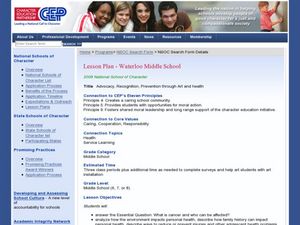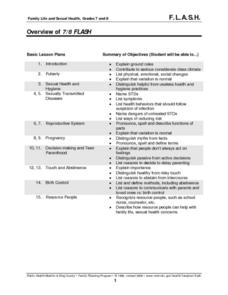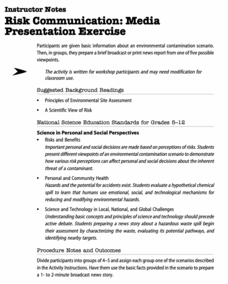Curated OER
Advocacy, Recognition, Prevention Through Art and Health
Students analyze how the environment and family history impacts personal health. In this personal health lesson, students discuss cancer and survey the school community about the disease. Students create a bulletin board about...
Curated OER
The Mind-Body Connection
Second graders learn about the human body. In this biology lesson plan, 2nd graders will begin with the basics of understanding charts and graphs and progress into units that cover the body systems, and mental and emotional health....
Just Health Action
Environmental Justice Matters: Mapping Cumulative Impacts (Part 2)
A case study enables class members to confirm whether different geographic parts of Seattle, Washington have disproportionate environmental burdens and benefits. Groups use the EPA's Cumulative Health Impact Analysis formula and...
Scholastic
Recovery From Drug Addiction
Are there factors that put some individuals at a higher risk for drug addiction than others? Learn more about the risk factors that may make some people more susceptible to addiction, as well as protective factors that help prevent...
Just Health Action
What Makes a Community Healthy?
Young people have an opportunity to make it a beautiful day in their neighborhoods with an activity that asks them to identify what is healthy and unhealthy in their community and develop some ideas about what they can do to fix the...
PBS
Stories of Painkiller Addiction: The Cycle of Addiction
Drug addiction, including prescription drug addiction, begins with a reason that's different for every user. High schoolers learn more about the reasons people begin abusing drugs with a set of videos and worksheets that discuss four...
Curated OER
Final Project Presentations: Water Quality
Students synthesize the information they have been researching on water quality to evaluate the potential health risks in a region with arsenic contamination. They prepare and present a persuasive speech that incorporates visuals.
Curated OER
Puberty/Adolescence Overview
Young scholars inquire about life science by completing a worksheet in class. In this human sexuality lesson, students define the physical and emotional changes which occur to male and female young scholars during adolescence and...
Curated OER
You Can Stop!!
Students analyze smoking behavior based on peer pressure. For this health lesson, students read and complete worksheets on the internet concerning the behaviors associated with smoking. They summarize what they have learned...
Curated OER
AIDS TODAY
High schoolers study the AIDS epidemic. In this health policy lesson students divide into groups and research the Internet to obtain information on AIDS.
Curated OER
The Best Place in the United States to Live
High schoolers, working in small groups, analyze information provided in U.S. maps to make a logical determination of the best place to live in the United States in regards to natural and human-made hazards. Then, working individually,...
Curated OER
FLASH
Students Distinguish among assertive, aggressive, passive and manipulative behaviors,Describe consequences of each,Formulate an assertive request,Describe how it feels to risk rejection. Students Describe how human immunodeficiency virus...
Curated OER
Risk Communication: Media Presentation Exercise
Students work in groups to prepare a brief broadcast or print news report from one of five possible viewpoints about an environmental contamination scenario. Students are given basic information about a chemical spill in a small town and...
Open Colleges
Your Brain Map: Strategies for Accelerated Learning
The brain is a complex organ with many different structures and functions. An interactive diagram allows learners to explore the different structures while pop-ups describe their functions. Secondary interactives show the structures of...
Curated OER
Designing Babies
Learners analyze current and emerging techniques used to select specific characteristics in offspring. They examine specific case studies and make ethical decisions based upon the Ethical Decision-Making Model.
OpenSciEd
Open Sci Ed: Covid 19 & Health Equity, High School Science
This unit is designed to support students in understanding the COVID-19 pandemic, transmission of the COVID-19 virus, and the impacts of the pandemic on communities, especially communities of color.
Khan Academy
Khan Academy: Final Student Activity
The Growth Mindset Activities are designed to help your students build growth mindsets and develop learning strategies to start the school year strong. This is the final activity to help you remember what you learned and help your...
Khan Academy
Khan Academy: Exercising My Brain
This article gives some examples of how your brain grows when you learn new things.
Khan Academy
Khan Academy: Mistakes Can Be Harmful Too
This article explains three common ways we allow mistakes to hurt our learning process.
Khan Academy
Khan Academy: Learn: Mistakes Are Opportunities
This article covers three common ways we allow mistakes to hurt our learning process.
Khan Academy
Khan Academy: Reflect: Mistakes Are Opportunities
This article describes three types of mistakes and some strategies for transforming them into opportunities to grow your brain. Reflection questions are included.




















